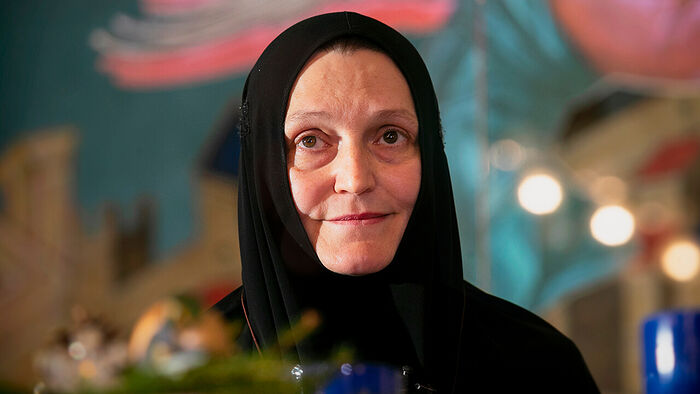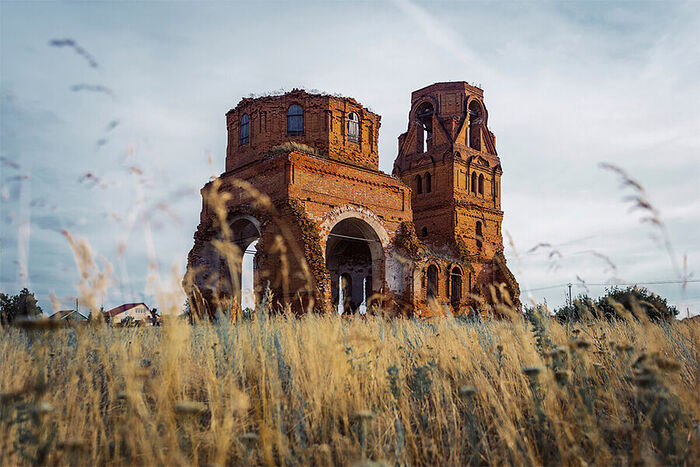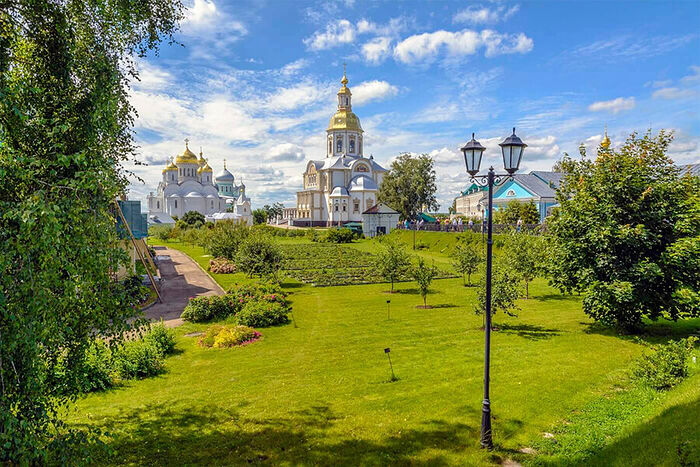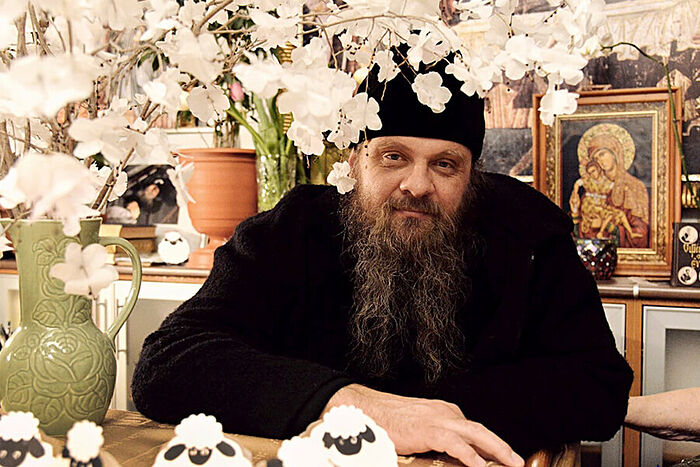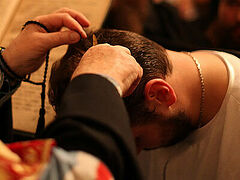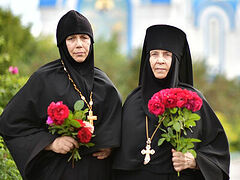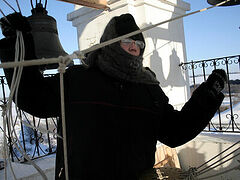Once a star of the stage, singer and director Tatiana Pashkova left a successful career, her beloved theater, and became not simply a nun, but the abbess of the Iveron Convent in the city of Orsk—a “heartfelt” monastery, as one Russian publication wrote about it. According to Mother Xenia, her encounter with her spiritual father, Archpriest Sergei Baranov, was the final chord in the secular composition of Tatiana Pashkova. In this interview, the abbess talks about her path and how the monastery is being built today.
Mother Xenia’s family was not churchly, but to the contrary quite Soviet—although her great-grandmother Agrippina, a simple village woman, was a believer, and as was later revealed, would pray before icons at night. According to Mother, the Lord was invisibly present in their family also thanks to her mother, who often repeated that we should live and act honestly, according to conscience, so as not to upset God.
—My mother raised me to strive for moral and creative perfection. She herself tried to approach everything in a positive light, quickly forgetting any unpleasantness. That is, my upward trajectory was laid down in my childhood, as well as the search for the state of eternity.
As a teenager, I would think about how people in art and culture could create something that remained for centuries. I understood that human life can be not just a brief moment, but can leave a useful mark for its contemporaries and future generations. Thus, from my youth, the desire arose in me to do something that wouldn’t quickly disappear but would continue to live on without me.
Young Tatiana was a wonderful singer. She won some serious competitions and wrote songs herself. Therefore, when the time came to choose a school, she left her tiny Siberian village for Moscow, for the Gnessin Music College. They accepted her after hearing her original songs. She studied there for four years, but she never went to the Church of St. Nicholas the Wonderworker that was next to the school. However, she already had her first experiences of something unseen…
—My friend and I would visit monasteries, still dilapidated then, just starting to be restored, just to look at the ancient architectural monuments. And amidst all this disorder, ruin, and dirt, I felt a prayerful atmosphere; I felt that eternity lived there—there was neither past, nor present, nor future.
After music school, I entered the Moscow University of Culture and Art, majoring in directing, and I ended up having a wonderful teacher—Yuri Vladimirovich Nepomnyaschy, who had a strong foundation in classical art. At the end of my fourth year, I was invited to the Russian State Central Concert Hall to assist the head director.
This was a period of climbing the creative career ladder. Outwardly, everything was more than fine: I was living in the center of Moscow, working at one of the leading concert halls. But an internal crisis was growing; it felt like I was in a vicious cycle—I couldn’t find any peace. Perhaps it’s natural and normal when someone doesn’t know God and lives without Him—he’ll have a gaping void inside one way or another. You try to fill this void with aesthetics, music, friends, travel—whatever you like. But the more you put in there, the faster it all burns up, like in a furnace…
Such ignorance and blindness are providentially given to man. The soul experiences bitterness, deadlock, and hopelessness in order to prepare for the encounter with the Lord.
I couldn’t seem to start a family no matter what, which tormented me with internal sorrows and worries. I also had some creative disappointments: I was trying to find my niche on the stage, in show business, but I felt deeply useless and inadequate, as if society didn’t need me. And through this state of inner disbalance and searching for something real, deep, and true, the Lord apparently led me to meet Himself.
We should say that by this time Tatiana had already been baptized. She received the Sacrament of Baptism when she was nineteen, when she was asked to become the Godmother for her friend’s son. This happened in Surgut, in the Church of St. Nicholas the Wonderworker.
—St. Nicholas has been especially revered in our family ever since an interesting incident happened to my mother. She was coming home from work one fall day when she saw a white piece of paper on the side of the road. She walked by, but she suddenly heard a voice inside: “It’s not good for a holy face to be lying in the mud.” She was shocked and went back to pick up the paper. It turns out that lying there in the mud, face down, was an icon of St. Nicholas the Wonderworker. We’ve had the icon in our family for many years now. Mama spoke to the saint in her own words as best she could, asking for his intercession and help.
Then I became a Godmother for the second time. For the sake of my Goddaughter and her mother, I went to church sometimes, where it was beautiful and peaceful. But my heart was silent. This happens to many who don’t know the Living God, because the Holy Spirit hasn’t touched them yet.
Then came my first trip to Diveyevo in 2006. The same friend and her husband took me on a pilgrimage there, an excursion, to see the ancient monastery. Her spiritual father strictly instructed her not to impose anything on me, not to drag me anywhere. After all, it’s only natural to fight back when someone drags you somewhere.
We stayed in a hotel near the monastery. As we were walking around, I dropped into a Church icon shop and bought a small book, How to Spend a Holy Day in Diveyevo. Spring was all around; the domes of the Diveyevo Monastery were off in the distance… I sat down on a bench and opened the pamphlet and … suddenly felt such love, purity, and light that it’s difficult to describe in words. It was like the sun was turned on inside me. And at the same time, I saw myself from the outside and realized the true state of my soul.
I returned to my friends saying: “I need to go to Confession right away.” It was impossible to tolerate my filth next to such purity and love. My friend had been trying to drag me to Confession for so many years, to explain what it is and why it’s necessary; she suggested books for me to read, and the Lord Himself turned everything around and explained everything in one moment.
The Lord responded to my desire to come out of this inner impasse and into the light, and seeing my heart and soul, He Himself came out to meet me, embrace me, and grant me to know the touch of grace.
I completely filled up a notebook, as if the light had been turned on in the dark room of my soul and revealed all the trash collected over the years, all the corners littered with garbage.
At Confession, I gave the notebook to the priest and stood there weeping. After Confession, the priest suddenly came up to me again, leaving someone else who was confessing: “You’re connected with art, with music; do everything you’ve been doing. Only not for the sake of glory or career, not for the sake of human praise, but serve God with your talents.” “You mean I should sing on the kliros, Father?” “I don’t know, I don’t know,” the priest said, thinking. “Maybe the theater.” I was surprised. The theater? That’s play-acting. Where is the theater and where is the faith I seem to have just acquired, having felt something living? After two years, everything was settled.
With that trip to Diveyevo, according to Mother Xenia, her conscious path towards God began, without any plans. She realized that God exists and that her life is in God’s hands.
—Two years later, I was introduced to Larisa Nikulina, the artistic director of the Living Water Orthodox theater, where I soon started working. Thanks to the theater, I learned much about our faith, Church feasts, holy ascetics. Larisa became my spiritual mother, as well as of many children who came to the theater.
I clearly see now that serving at Living water was my preparation for monasticism. Five years of close communication with Larisa Nikulina was for me a period of spiritual revelations, encounters with interesting people, and trips to holy places. But most importantly, I got acquainted with Orthodoxy, so full of joy in Christ.
In the play Name’s Day, I played the simple, warm-hearted, and deeply religious babushka Daryushka, based on the nun Isidora. Babushka Daryushka became a spiritual friend for me. I read a book about her and noted many qualities that I don’t have but would like to acquire—kind-heartedness, simple and firm faith, hope and trust in God, responsiveness, and mercy, which loves even enemies.
The book described how the pilgrim Daria endured ill treatment towards herself, her meekness, and gentleness—such an evangelical, Christ-loving soul, which bears Christ within itself, and therefore the fruits of the Holy Spirit are manifested not just in words, but precisely in deeds.
After all, knowing God in theory certainly does not mean living by God, being a man of God. You can say many and beautiful things about God but not know God and not live by Him.
After the initial stage, when God’s grace covers you and you start flying, a period begins when your faith is tested in small things, in details—not in conversations, but in your attitude towards people. And you understand that it’s one thing to feel and experience God, and another to live by God.
Daria was a person possessed of the gifts of the Holy Spirit, like Batiushka Seraphim, who didn’t resist the robbers. So, thanks to my acquaintance with holy ascetics, the question began to arise within me how such a life is possible; there arose the desire to have such qualities for myself at least to some extent.
At the same time, she was searching for a spiritual father. Mother Xenia asked St. Seraphim of Sarov that she might meet someone suitable. Interestingly, her “meeting” with her spiritual father began long before their meeting itself.
—Long before I met Fr. Sergei, a friend came from Athos and brought, among other gifts, a 100-knot prayer rope, saying he had visited a Russian monk, Elder Gregory.
Two years later, after I’d already become a spiritual child of Batiushka Sergei, he picked me up from the airport one day, and starting a conversation about the Jesus Prayer, he asked whether I had a prayer rope. “I do,” I said, showing him this Athonite prayer rope. “That’s my prayer rope!” It turns out, he had been in the cell of this monk and left his prayer rope there… How could this be a coincidence?
I must say that my meeting with Fr. Sergei also took place thanks to the Living Water theater, which went on tour to faraway Orsk. Fr. Sergei was there at concerts and performances at various venues throughout the city, helping to put the set together. I saw how Batiushka warmly embraced a group of prisoners, and they clung to him like little children. I also saw the cathedral that was under construction. It was amazing and hard to understand how Batiushka could manage and combine so many things.
The tour finished and Fr. Sergei arranged a farewell dinner for us, right there in the steppe. There, Batiushka shared that there was a sisterhood not far from there where the sisters lived an ascetic life with the hope that a monastery would appear there. I remember sitting there thinking: “Lord, help the dream of these good people come true.”
But what to choose—family life or monasticism—I didn’t know then. That evening I had my first conversation with Batiushka Sergei and I shared my doubts. A young man was waiting for me in Moscow, who invited me on a trip to Diveyevo just before I left for Orsk. But by the time of my conversation with Batiushka, another unusual incident occurred, after which I started doubting whether I should go…
We were riding in a car and Fr. Sergei, completely unaware of my situation, began talking about how the evil one never proposes sin outright, but presents it as a completely pious intention, say, in the form of a trip to a holy place. And suddenly he added: “To Diveyevo, for example.” I was simply taken aback…
I wanted to open up to Fr. Sergei, to ask him about myself. He didn’t give any advice, but simply said: “Let’s pray. Don’t rush; everything will be fine.”
At the airport, Batiushka gave everyone books about the spiritual life and signed them for everyone. Fr. Sergei gave Tatiana the book, Principles of the Spiritual Life, where all the advice was intended for monastics.
—After that trip, I returned to Moscow with the desire to continue communicating with Batiushka and live in obedience—not according to my own will, but with faith that through obedience to your spiritual father, you find Christ Himself.
One time, an artist came and stayed with me after seeing Fr. Sergei in Orsk. I learned even more about Fr. Sergei from her—how he serves, how he lives. I learned about their community, about the homeless shelter, about the home for disabled children, and that Batiushka himself has six children. Svetlana gave me a book from Batiushka. It was by Fr. Sophrony (Sakharov). It turns out the book was signed:
A disciple played a beautiful classical work for one of the Optina Elders. “Yes, the music is nice,” the Elder said. “But if you knew, child, what the music of the Spirit sounds like, how wonderful and incomparable it is, you would seek nothing else.” Tanya, the most precious thing we can acquire on earth is Christ: Long for Him, look for Him, and be happy.
Your Fr. Sergei
5/13/12
To be continued…

